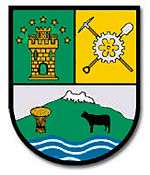Mejia
Mejia, Mejía, Mexia, Mejias or Mejías may refer to:
- Mexia High School
- Mexia Independent School District
- Mexia News, a newspaper published in Mexia, Texas
See also
- Hospital Ramos Mejía, a hospital in Buenos Aires, Argentina

Mejía Canton
Mejía is a canton in the province of Pichincha in northern Ecuador. It is named after Ecuadorian political figure José Mejía Lequerica. The canton includes a volcano in the Central Cordillera of the Ecuadorian Andes called Rumiñahui. The seat of the canton is called Machachi.
Machachi is located to the south of the capital of Ecuador, Quito. It is a very beautiful city surrounded by the volcanos Atacazo, Corazon, Rumiñahui, Illinizas peaks, Viudita hill, Pasochoa, Sincholagua and is also owns part of the Cotopaxi volcano, a great active volcano which measures 5,897 m (19,347 ft) in altitude. The valley contains 8 volcanoes, the reasons why Alexander von Humboldt named the region Avenue of Volcanoes.
In the Panzaleo language it means: Great active land. Machachi is the cradle of many slopes and the same ground is a perennial thermal and mineral water outcrop. In the fertile valleys of San Pedro there are approximately 22 sources of chemicals which have invaluable theurapeutical properties.

Mejía (surname)
Mejía(s) or Mejia(s), also written as Mehia(s), Mexia(s), or Megía(s), is a Spanish surname. Several theories exist as to its origins and etymology. The prevailing belief is that the name has Galician origins. The surname is most common in Latin American countries, including Colombia and Mexico, and Spain.
The surname may have originated as a toponym for the town of Muxia in Galicia, an autonomous community in north-western Spain. Another idea is that the word "Mexia" used to mean "medicine" in an old variant of Spanish, and that this is where the surname came from.
One common belief is that the name may have Sephardic origins, from when the Spanish Kingdom forced Jewish settlers to change their surname to Castillian. The translation of the surname for "Messiah" would then become the name "Mesía". However, the Spanish people who travelled to the Spanish colonies in South America were not allowed to be Jewish or to have any Jewish or Muslim ancestors, and thus this explanation may not account for the popularity of the surname in modern-day Latin America.
Podcasts:

